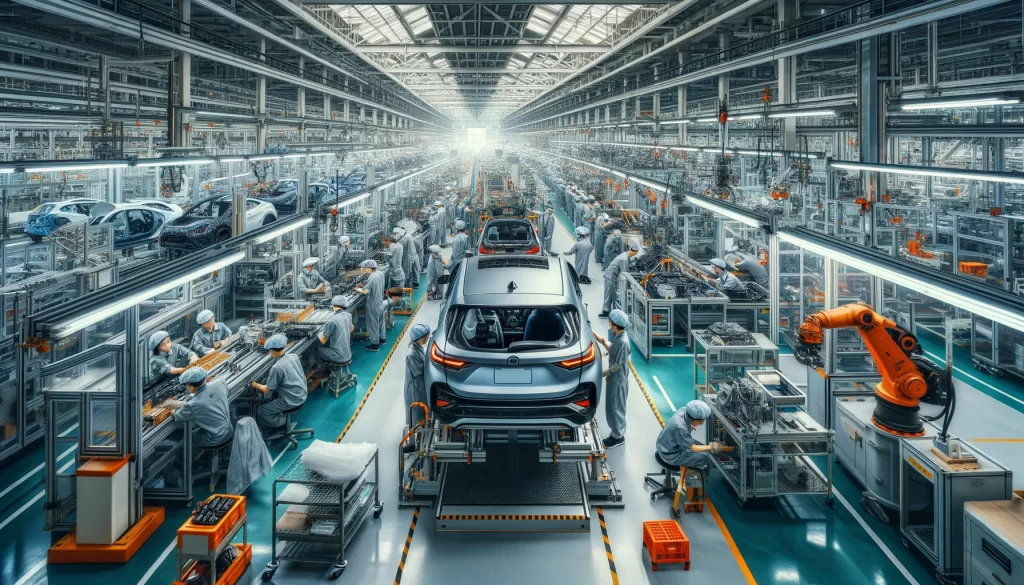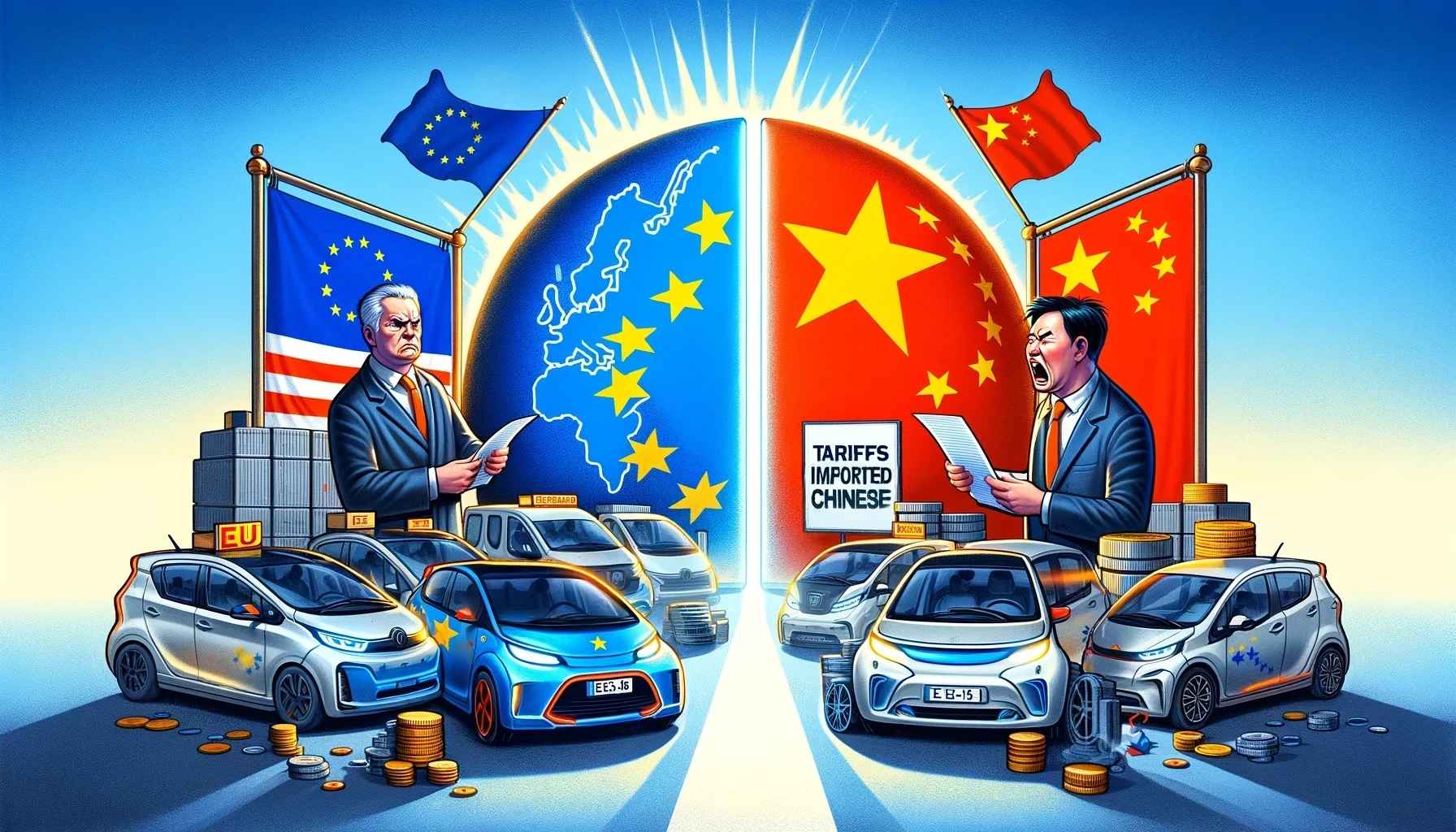The European Union (EU) has decided to increase tariffs on electric vehicles (EVs) imported from China, escalating trade tensions between the two regions. The move aims to protect the EU’s automotive industry from what it considers unfair competition due to significant subsidies provided by the Chinese government to its EV manufacturers.
Background and Announcement: On June 12, 2024, the European Commission announced that it would impose additional tariffs ranging from 17.4% to 38.1% on Chinese electric vehicles, in addition to the existing 10% duty. These measures are set to take effect on July 4 and could be applied retroactively. The companies affected include major Chinese manufacturers such as BYD, Geely, and SAIC, as well as Western automakers like Tesla and BMW that produce EVs in China for export to Europe.
Reasons for the Tariffs: The European Commission initiated an investigation in October 2023 to determine whether Chinese EV manufacturers were benefiting from unfair subsidies. The preliminary findings indicated that Chinese EVs were sold at prices lower than their European counterparts due to substantial governmental support. This influx of cheap EVs threatened the viability of the EU’s domestic industry. The value of Chinese EV imports has dramatically increased from $1.6 billion in 2020 to $11.5 billion in 2023, making up a significant portion of the European market.
Details of the Tariffs: The tariffs vary by company and are based on their cooperation with the EU’s investigation. For instance, BYD will face a 17.4% tariff, Geely will face 20%, and SAIC will face 38.1%. Companies that cooperated with the investigation, such as Tesla and BMW, will face a 21% tariff, while non-cooperating entities will be subject to the highest rate of 38.1%.

Economic and Political Reactions: The announcement has drawn mixed reactions. European automakers, particularly those with significant operations in China like BMW and Volkswagen, expressed concerns about potential retaliation from China and the overall economic impact. “The increase in import tariffs in the E.U. could trigger a fatal dynamic of measures and countermeasures and result in an escalation of trade conflicts,” said Volkswagen in a statement. German Chancellor Olaf Scholz criticized the move, arguing that it could lead to higher prices and economic instability: “Isolation and illegal customs barriers — that ultimately just makes everything more expensive, and everyone poorer”.
China has condemned the tariffs, labeling them as protectionist measures that could harm China-EU economic cooperation. Chinese Foreign Ministry spokesperson Lin Jian described the EU’s investigation as a “typical case of protectionism” and warned that Beijing would take necessary measures to protect its interests. Despite this, the Chinese Passenger Car Association downplayed the impact, noting that the tariffs were within expectations and that Chinese EV manufacturers could still compete effectively in the European market.
Impact on the Market: The tariffs are expected to have significant economic implications. According to the Kiel Institute for the World Economy, a 20% tariff could reduce Chinese EV imports by 25%, potentially offset by increased production in Europe. However, European manufacturers may not fully fill the gap, leading to higher overall prices for EVs due to the higher production costs in Europe.
Future Outlook: The EU has expressed a willingness to engage in discussions with Chinese officials to resolve the dispute. However, if no resolution is reached, the final tariffs will be enforced for five years starting in November 2024. This situation highlights the growing complexities in international trade, especially in the rapidly evolving EV sector. Both the EU and the US have taken steps to curb Chinese dominance in green technologies, reflecting broader geopolitical and economic strategies.
This article is based on the following articles:

Background Information
1. What Are Tariffs?
Tariffs are taxes imposed by a government on imported goods. These taxes can make imported products more expensive, which can help protect domestic industries from foreign competition. By raising the price of imported goods, tariffs can make domestically produced goods more competitive in comparison. However, tariffs can also lead to higher prices for consumers and can spark retaliatory measures from other countries.
2. What Are Subsidies?
Subsidies are financial support provided by governments to help boost certain industries or economic activities. These can come in various forms, such as direct payments, tax breaks, or low-interest loans. Subsidies can help industries grow by lowering production costs, allowing companies to sell their products at lower prices. However, when subsidies are perceived as giving unfair advantages to certain companies or countries, they can lead to trade disputes.
3. The Electric Vehicle Market:
Electric vehicles (EVs) are cars that run on electricity instead of traditional fuels like gasoline or diesel. EVs are considered more environmentally friendly because they produce fewer emissions compared to conventional vehicles. The global market for EVs has been growing rapidly as governments and consumers seek to reduce their carbon footprints. China is the largest market for EVs, followed by Europe and the United States.
4. China’s Role in the EV Market:
China has become a dominant player in the global EV market. Chinese companies like BYD, Geely, and SAIC have benefited from substantial government subsidies, enabling them to produce and sell EVs at lower prices than many of their international competitors. This has allowed Chinese EV manufacturers to gain significant market share in other regions, including Europe.
5. Trade Relations and Tensions:
Trade relations between countries can be complex and are influenced by various economic and political factors. When one country imposes tariffs or other trade barriers, it can lead to tensions and retaliatory measures from other countries. The current situation between the EU and China is part of a broader pattern of trade disputes involving not just these two entities, but also other major economies like the United States.
6. The European Union (EU):
The EU is a political and economic union of 27 European countries that are located primarily in Europe. It has its own governing institutions, including the European Commission, which is responsible for proposing legislation and implementing decisions. The EU operates a single market, which allows for the free movement of goods, services, people, and capital within its member states.
7. The Rationale Behind the EU’s Decision:
The EU’s decision to increase tariffs on Chinese EVs stems from concerns that Chinese manufacturers are benefitting from unfair subsidies, which allow them to sell their products at lower prices and outcompete European manufacturers. By imposing higher tariffs, the EU aims to level the playing field for its domestic industries, ensuring that European companies can compete fairly in the market.
8. Potential Impact of Tariffs:
Imposing higher tariffs on Chinese EVs can have several consequences:
- Economic Impact: Higher tariffs can lead to increased costs for consumers, as the prices of imported EVs rise. This could slow down the adoption of EVs in Europe, affecting the region’s environmental goals.
- Trade Retaliation: China may respond with its own tariffs on European goods, which could escalate into a trade war, harming industries in both regions.
- Market Dynamics: European manufacturers may benefit from reduced competition, but they will also face higher costs if they rely on Chinese-made components for their vehicles.
9. The Role of the United States:
The United States has also increased tariffs on Chinese EVs, reflecting broader concerns about China’s trade practices and the impact of Chinese subsidies on global markets. The actions of the EU and the US are part of a larger effort to address perceived trade imbalances and protect domestic industries.
10. Environmental Considerations:
Both Europe and China are major players in the global push towards greener technologies and reducing carbon emissions. The development and adoption of EVs are crucial components of these efforts. While trade measures like tariffs are intended to protect domestic industries, they can also impact the broader goal of transitioning to sustainable energy sources.
11. Future Prospects:
The ongoing trade tensions between the EU and China, and similarly between the US and China, suggest that the global trade landscape will remain volatile. The resolution of these disputes will require negotiations and cooperation to ensure that trade policies support both economic growth and environmental sustainability.

Debate/Essay Questions
- Is it more beneficial for consumers to have access to cheaper, subsidized electric vehicles from China, despite the potential harm to local industries?
Please subscribe to Insight Fortnight, our biweekly newsletter!
